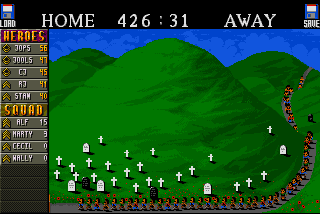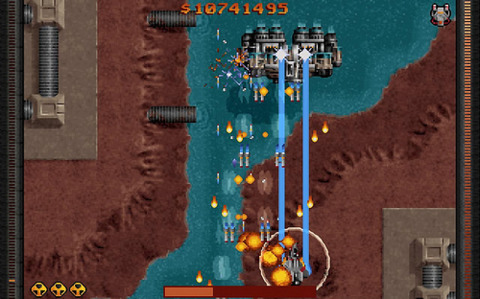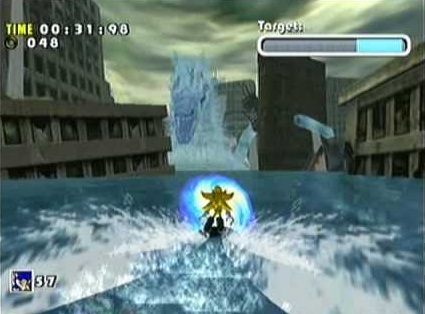Musical Imagery
By Starshine_M2A2 1 Comments

When I was a child, my interest in popular music was next to zero. I was not in touch with popular musical trends or what was in the charts. There were bands and songs that would be sung by my classmates that I had never heard of. But I didn't mind because while music was popular with my friends, my interests lay squarely within the realm of games. Rather than spending time in my bedroom socialising with generic background R&B music playing, as they would often do, I would be killing aliens and blowing up spaceships on Cannon Fodder and Raptor: Call of the Shadows. I thought anyone who preferred talking to other human beings was bonkers. It's ironic then that games were my first exposure to the power of music.
For me a massive part of music is it's association with imagery. Cannon Fodder came to my attention first with the opening title song 'War Has Never Been So Much Fun' juxtaposed with cartoonish images of stubby, fat soldiers yelling at each other while also splicing them into real black and white backgrounds of battlefields during the introductory cinemtatic. The game's attitude to war took a satirical approach that reduced soldiers to caricatures and war to a sport where the menu screen even had a score board with each side's death count labeled as 'home' and 'away'. But the tone quickly becomes more serious as the main menu consists of a green hill with grave stones representing each soldier you had lost on various levels. Accompanying this was a sad, melancholic instrumental theme. This ingenious use of music and image created the intentional contradiction between the blasé attitude to death so often seen in various forms of entertainment - illustrated by the opening sequence next to the seriousness of the sheer numbers now seen buried on the hillside. Interpreted today, this was a game highlighting the gung-ho attitude of soldiers in John Wayne war films, which often featured absurdly patriotic musical themes and then replacing that with the kind of brutal honesty they so often avoid.

The images of your dead and their sad musical theme sap the pleasure from the disproportionate score board.
Raptor: Call of the Shadows didn't have the satirical message of Cannon Fodder but had a soundtrack designed specifically to create adrenaline for the game's fast paced and hectic aerial combat. The soundtrack expertly weaved between a bombastic military theme that wouldn't be out of place in a Michael Bay movie to more suspenseful build ups consisting of a slowly rising beat as the jet approaches the final boss of each sector. The speed and tone of the music generated nothing short of panic during the more intense moments when waves upon waves of enemy fighters are attacking the player's lone jet and they try to resist dropping their last megabomb that they were saving for the boss. This is still a prime example of music creating emotion appropriate to gameplay rather than story instead of the reverse readily favoured by modern fantasy games for ambient effect.

Fights often become a ballet of gunfire and explosions.
As much as I enjoyed the music in both of these titles, I was not exposed to a soundtrack containing actual lyric driven songs for a game until 1999's Sonic Adventure for the Dreamcast. This was also one of the first 3D adventure game I had ever played. The soundtrack consisted of the screaming guitars and lightening fast drum solos of Crush 40 to accentuate the speed of Sonic's levels. As he would charge down a ramp suspended in mid-air on the Windy Valley stage you would be treated to a searing combination of guitars and vocals that created not only adrenaline but a sense of the power of speed rather than simply speed itself - that by going fast enough your could run up vertical walls and jump hundreds of feet into the air. The game's snowboarding sequence featured a punk rock theme you would associate with snowboarding culture that would rise and fall each time Sonic performed a spectacular stunt on his board while plummeting down the mountain's cliff faces and landing without a scratch. The game's music revealed itself as having the ability to represent heroes able to do truly extraordinary things and it was the music that gave their actions weight, not the fact that Sonic was just incredibly fast or that you were playing a game that was far removed from reality. The final boss fight between Super Sonic and Perfect Chaos is nothing short of a titanic clash between two god-like beings whose power to inspire owes a great debt to the song 'Open Your Heart' that plays during the fight. The song begins with two powerful strikes of guitar strings that serve as the bell ring to start the fight while also illustrating the finality of the struggle between these two immensely powerful characters - Super Sonic, when traveling fast enough, is able to run on water while Chaos had destroyed an entire city moments before. The song then allows riffs and drums to take over.
It's a wonderful combination of music and action that create a power even the best action movies seldom achieve. Once I had beaten Chaos I felt like I had just run a marathon - that I had achieved something truly epic. And ultimately that's the games magic. It's expert use of music allows the player to truly take on the role of a hero rather than merely controlling a hero. I wanted to do all the things that Sonic was doing in the game. I wanted to be able to perform impossible jumps and run up walls to the sound of guitars more than anything else in the world just to show what the power of the game's music had built up inside me - an urging to do something spectacular. This was the experience that inspired me to get into heavy metal music as I began looking for new and different ways to replicate it. I loved the promotion of heroic ideals and the message of triumph over adversity and so it wasn't long before I was listening to power metal bands like Helloween and Dragonforce.

Inspired by a heavy metal song, Super Sonic (and the player) charge at Perfect Chaos who dwarfs the heroic hedgehog.
I wouldn't say that modern use of music in games is any better or worse today but it is very different. With so many games relying on atmosphere these days, It's difficult to find a game that actively makes use of a strong soundtrack. Games like World of Warcraft and F.E.A.R. feature outstanding musical scores but only for the purposes of creating a world that is vibrant and absorbing rather than attempting to illicit strong emotions from the gamer inherent to the perils and trials of what your character faces. After all, we do put computer game characters through some very tough times, it's only fair that they should have some encouragement with their own fist pumping theme song. One of the few recent example I can name is Alan Wake. The soundtrack to the game is a corker featuring the likes of David Bowie and Poets of the Fall who also wrote songs for Remedy's Max Payne 2. The character of Alan Wake is a man constantly pushed to the edge of his sanity by the surreal situations he faces on each level and the songs were specifically chosen for their equally surrealistic content. As Wake grows increasingly detached from reality, it's no wonder that the game ends with the lyrics 'ground control to major Tom'...
As games become more and more like movies in their cinematic content and developers continue hiring professional film composers more often, what I'd ultimately like to see is developers willing to approach their scores with an eye for creating positive and negative emotion rather than simply integrating them into the atmosphere of the level and songs are a great way of doing so. Otherwise, music becomes exactly what my friends listened to in their bedrooms - background music.